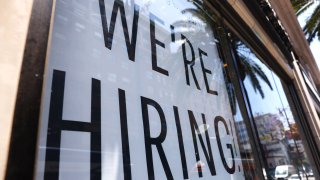
Americans left their jobs in record numbers last year during the Big Quit. Roughly 47 million workers quit their jobs in 2021, including people leaving due to Covid-19 or switching careers. Months later, companies are still looking to fill roles and up the ante with bonuses, even resorting to paying new hires to take vacations. There’s one demographic, however, that still remains largely untapped: individuals with justice-involved backgrounds, or a criminal record.
It’s no secret that people with criminal records have a hard time finding work. According to the Society for Human Resource Management (SHRM), only 5% of managers and 3% of HR professionals actively recruit candidates with criminal records for open roles. With the current state of the labor market, justice-involved individuals could be the saving grace for employers struggling to fill open roles.
According to Brian Matthews, senior vice president at Appriss Insights, a division of Equifax dedicated to growth strategy and people-based risk, now is the best time to hire people with criminal records.
“Not only does it build a new talent pool of workers to help address the nation’s ongoing labor shortage head-on, but it also gives a second chance to those in need,” he tells CNBC Make It. “This movement provides a great opportunity to strengthen businesses and improve inclusiveness in the workplace.”
Get top local stories in Southern California delivered to you every morning. >Sign up for NBC LA's News Headlines newsletter.
Matthews says that “businesses who have already adopted this strategy are reaping the benefits," such as Starbucks and Home Depot. The value new employees with criminal records bring to an organization is viewed as equal or even higher than that of workers without records by 82% of managers, according to research from SHRM.
Not only does this benefit the employer, but the individual as well. Employment is proven to decrease recidivism, or the likelihood to re-offend for people with criminal records. Hiring these individuals can also aid in racial justice, as Black people have been disproportionately criminalized and have harder times reentering the workforce after incarceration than their white counterparts.
Though research shows employment helps with recidivism, Matthews says that it’s not “enough.”
Money Report
“Justice-involved individuals also need support from employers. This could come in the form of providing opportunities for them to resume their education, pursue skill-based training/certifications and counseling that can explain their return to work,” says Matthews. “Support from employers is crucial for individuals as those who participate in education programs have a 43% lower chance of being reincarcerated than those who do not.”
As businesses shift to more inclusive work environments and hiring practices, it’s important that people with criminal records aren’t forgotten about. To combat this, several states have adopted “Ban the Box” laws to increase job opportunities for ex-offenders by restricting criminal conviction disclosure questions. Though employers are still conducting background checks on these individuals, Matthews says Ban the Box “ensures managers are considering the quality of an applicant before learning of or considering their criminal history,” and recommends companies take advantage of the movement.
According to Matthews, companies hoping to embed diversity and inclusion into their culture must start with diverse leadership, and continuous support for their employees.
“Companies should be following up with actions to create a safe and inclusive workplace for all. Educating your leaders, recognizing differences within the workplace, and genuinely listening to your employees will help build a space where the entire team can feel like they belong. The end goal should be to level the playing field while eliminating biases and any form of discrimination.”
Check out:
38% of workers still experience harassment remotely—here’s what employers can do about it
The demand for flexible work ‘will only accelerate’ in coming years as workers feel more empowered
Alumni of these 10 HBCUs earn more than other Black graduates in their states
Sign up now: Get smarter about your money and career with our weekly newsletter






